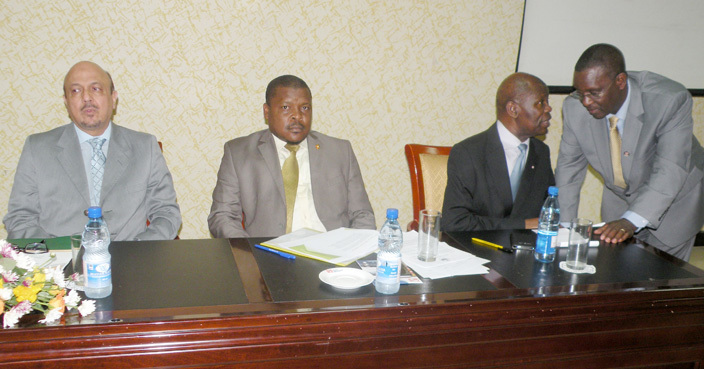Government sets tough laws for labour exporting agencies
Feb 14, 2016
Last month the Ugandan government together with the ministry of labour and social affairs in Saudi Arabia, facilitated the return of the seven women who had got stranded in Riyad.

The ban on exportation of domestic workers to Saudi Arabia and other countries will remain until investigations into the alleged harassment of Ugandans in Saudi Arabia are completed.
The Permanent Secretary, ministry of gender, labour and social development, Pius Bigirimana while speaking to labour exporting agencies at Hotel Africana last week he said, "Our investigating committee is doing its work together with the Saudi Arabian government. We are also holding bilateral talks with the Saudi government."
Last month the Ugandan government together with the ministry of labour and social affairs in Saudi Arabia, facilitated the return of the seven women who had got stranded in Riyad.
This followed complaints from the women of Ugandan origin who called the Embassy seeking its intervention in a bid to get their freedom.
Bigirimana said they want to find out who took those girls, who tortured them and what they were doing in Saudi Arabia, before making a conclusion.
He said the Ugandan team is working together with the Saudi government to have the perpetrators brought to book.
 Right- Left: Permanent secretary from the ministry of labour, gender and social development, Pius Bigirimana interacts with the state minister for relief, disaster preparedness and refugees, Hilary Oneck as Ambassador of Uganda to Saudi Arabia Dr Rashid Yahya Ssemuddu and Ambassador of Saudi Arabia to Uganda, Jamal Bin Abdul-Aziz Raffa observes. Photo/ Ramadhan Abbey
Right- Left: Permanent secretary from the ministry of labour, gender and social development, Pius Bigirimana interacts with the state minister for relief, disaster preparedness and refugees, Hilary Oneck as Ambassador of Uganda to Saudi Arabia Dr Rashid Yahya Ssemuddu and Ambassador of Saudi Arabia to Uganda, Jamal Bin Abdul-Aziz Raffa observes. Photo/ Ramadhan Abbey
"We shall release our findings when investigations are done," he added.
Bigirimana said this would help government better understand the problem of labour export, nature and extent of violation of the rights of Ugandan migrant workers and ultimately propose evidence based reforms.
He said they have put in place new measures on labour exportation to foreign countries.
"All job orders must be submitted with the contractors' terms and conditions for approval to the ministry. It will help us verify if these companies are genuine and whether these jobs exist," he said.
Labour exporting agencies will also have to send the list of their vetted candidates for recommendation of visas.
"The ministry will be responsible for writing to various embassies for visas with lists of those vetted, with a recommendations letter signed by the PS," he said.
He said this will easily help us in case of any problem.
"The biggest problem is the unlicensed labour exporters and those who take themselves. Through these measures, we shall curb the problem," he explained.
The commissioner anti-human trafficking at International Police, Stephen Otim said no one will be issued with a certificate of good conduct without an a signed recommended letter from relevant recruiting agency.
"We have realized that many are duped by fake companies and individuals. This will help us know whether the companies sending these people are licensed or not, to phase out illegal dealers," he explained.
The Ambassador of Saudi Arabia to Uganda, Jamal Bin Abdul-Aziz Raffa said his government is ready to take action on the culprits.
"We have also embarked on investigations to get to know who is behind all this. If your team gets evidence, please give it to us, so that we take action. Ugandans should wait for the outcomes of the investigations before jumping to conclusion," he said.
Moses Binoga the director, anti-human trafficking desk, cited the problem of agents and formers workers of recruiting companies.
"We need a clear strong policy on agents. Some recruit in the name of other companies and after trafficking people they disappear. People must use licensed companies to be on the safe side," he added.
A group of lawyers and Civil Society Organisations (CSOs) have also started registering and investigating cases of exploited and missing girls who were allegedly taken to work in Arab countries.
While launching their campaign;"Justice for African Workers", at their offices in Kampala yesterday, the chairperson of campaign, J. Mayambala M. Wafrika said they have started gathering evidence and recording statements from various victims and complainants from parents of alleged missing girls.
"We have so far registered 15 cases. We are still gathering more information. Our team has to go to the ground and authenticate the truth," he said.
